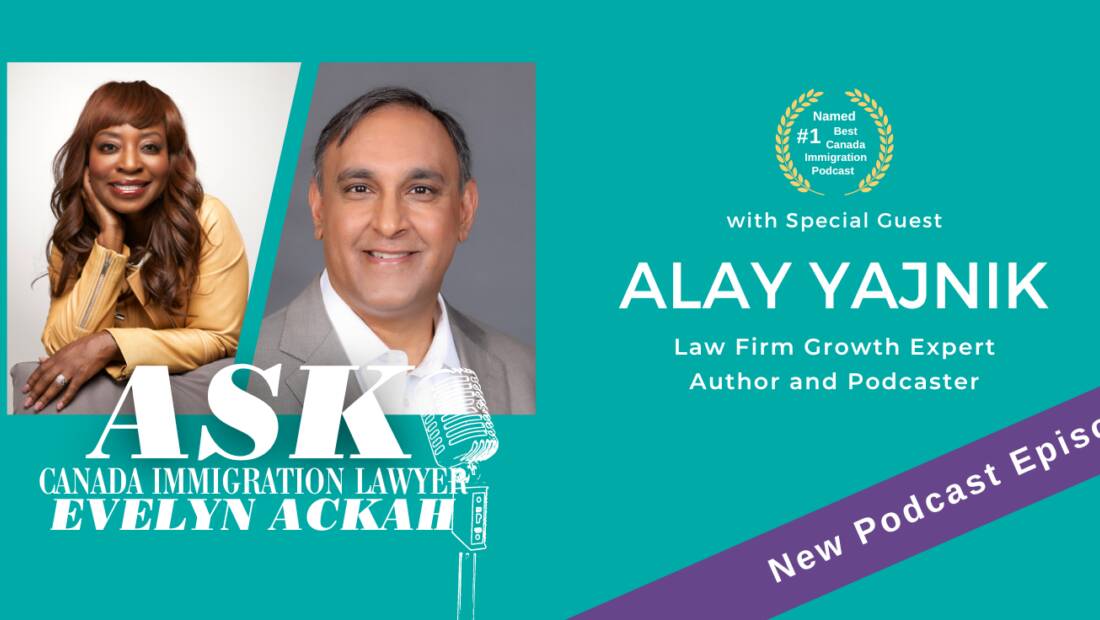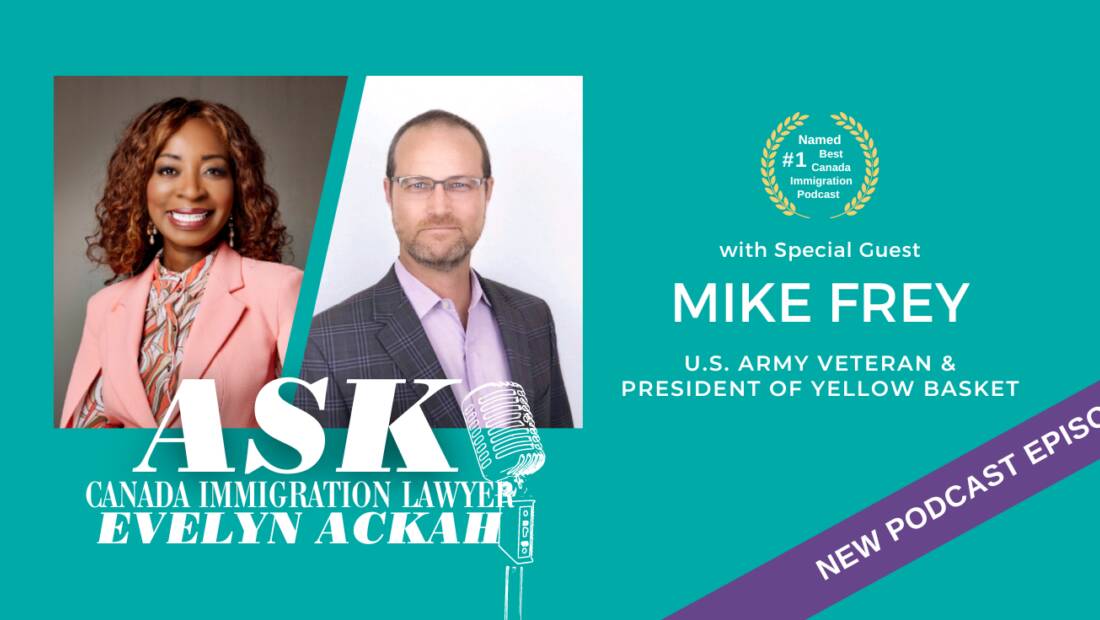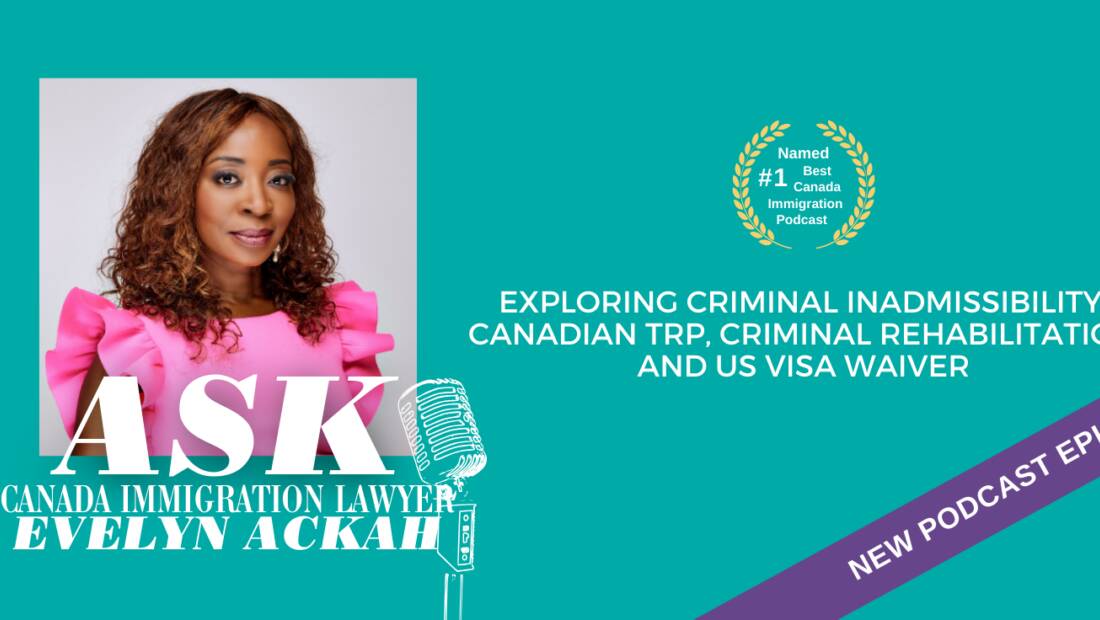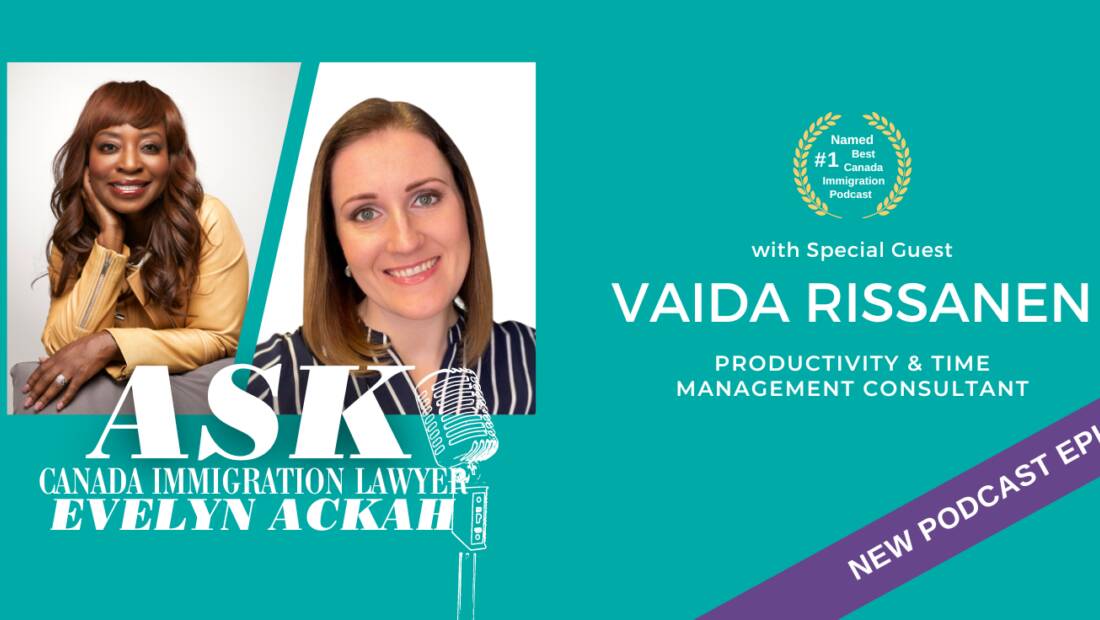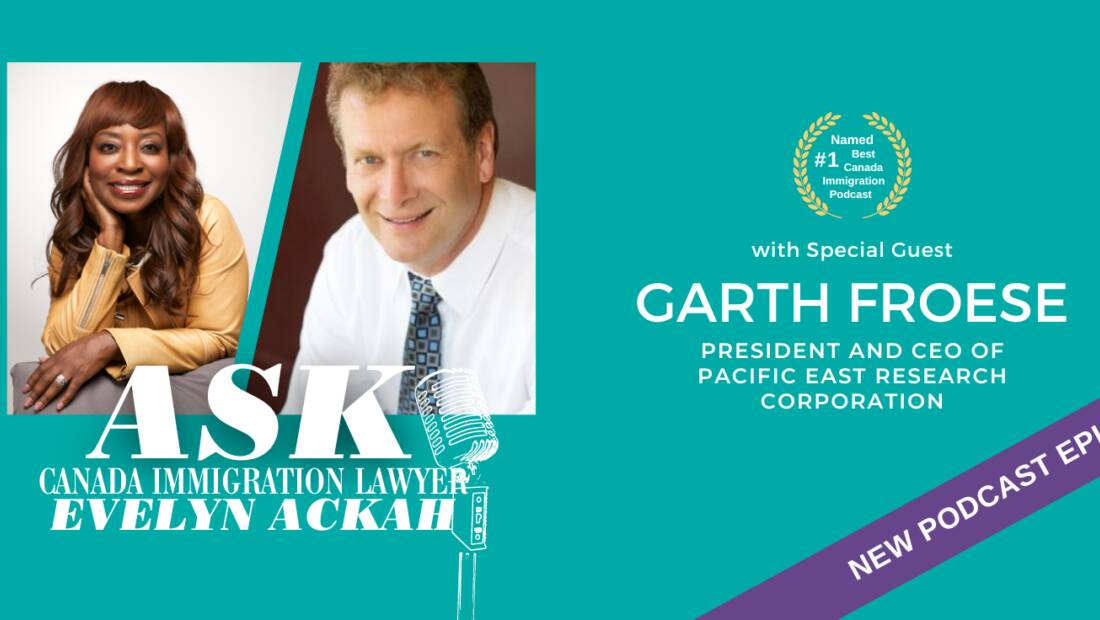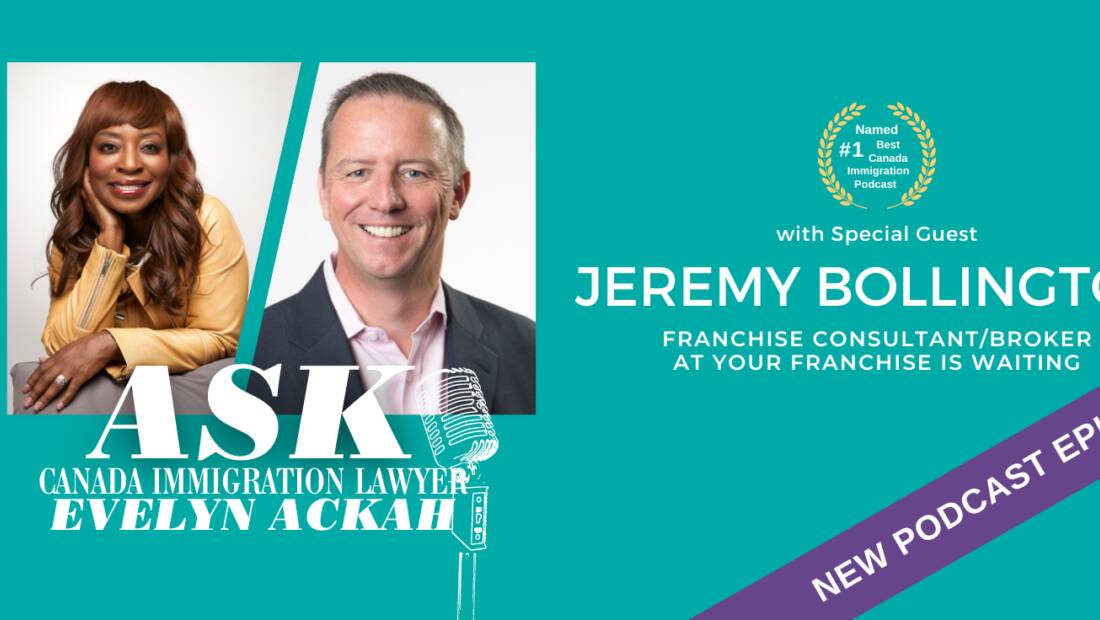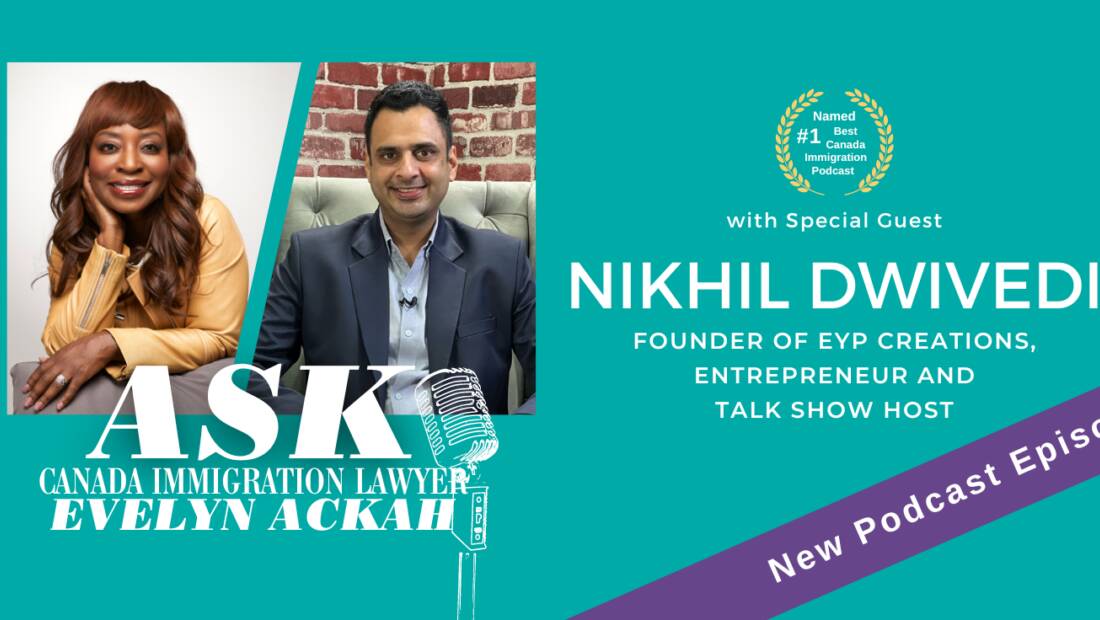Or listen on your favourite podcast app
On the Ask Canada Immigration Lawyer Evelyn Ackah podcast, host Evelyn Ackah interviews Alay Yajnik, a law firm success growth expert and business coach. Alay shares his background in corporate business and training, and how he transitioned into coaching law firm owners. He discusses the common issues that keep his clients up at night, such as lack of income and overwhelming workloads. Alay emphasizes the importance of hiring the right employees and investing in their development to improve employee retention. He also touches on the benefits of niching down and the challenges of working with partnerships. Alay provides insights into his coaching process and encourages lawyers to seek external support to grow their firms. Alay Yajnik is host of Lawyer Business Advantage Podcast, and author of Staffing Up: The Attorney's Guide to Hiring Top Talent.
Evelyn was a guest on the Lawyer Business Advantage Podcast with Alay Yajnik on Episode 140: Law Firm Growth, where they talked about:
- The roller coaster of entrepreneurship
- Building a remote, global team
- Delegating to better serve your clients
- Adversity creating business excellence
Connect with Alay Yajnik:
Email: alay@yajnikgroup.com
Company: https://www.lawfirmsuccessgroup.com
LinkedIn: http://linkedin.com/in/alayyajnik
Podcast: http://lawyerbusinessadvantage.com
BOOK YOUR FREE CASE EVALUATION
The conversation highlights Alay Yajnik's expertise in guiding law firms toward sustainable growth, emphasizing the importance of implementing proven systems while maintaining work-life balance and quality of life. Here are the key takeaways from Evelyn Ackah's podcast interview with Alay Yajnik:
Alay's Background: Alay specializes in teaching law firm owners in the US (and potentially Canada) how to grow their firms using proven systems. He aims to help lawyers achieve growth without sacrificing work-life balance, enabling them to avoid working evenings and weekends.
Focus on Growth and Quality of Life: Alay's approach emphasizes maximizing growth potential while maintaining a high quality of life. He assists law firms, particularly solo and one-to-two partner firms, in making more money, taking more time off and enjoying their work by implementing effective growth systems.
Empowerment through Systems: Alay's Law Firm Success Group empowers law firms by implementing proven growth systems. These systems aim to streamline operations, increase efficiency, and ultimately lead to greater financial success and personal fulfillment for lawyers.
Award-Winning Business Coach: Alay is recognized as an award-winning business coach, author, and speaker, further validating his expertise in helping law firms achieve their growth and success goals.
Resources Available: Alay's book "Staffing Up" provides valuable insights into hiring top talent for law firms and is available on Amazon. Additionally, his podcast serves as a valuable resource for lawyers looking to enhance their practices and achieve growth.
About Evelyn Ackah
Evelyn Ackah is the Founder and Managing Lawyer at Ackah Business Immigration Law. With offices in Calgary, Toronto and Vancouver, we work with individuals and business owners from all over the world who want to cross borders seamlessly. For more information on immigration to Canada or the United States, Ask Evelyn Ackah at Ackah Business Immigration Law today at (587) 854‑3821 or email Evelyn directly at contact@ackahlaw.com.
The Ask Canada Immigration Lawyer Evelyn Ackah podcast by Calgary Immigration Lawyer Evelyn Ackah was named #1 Best Canada Immigration Podcast in 2023 by Feedspot.
BOOK YOUR FREE CASE EVALUATION
Transcript
Evelyn:
Good day, everyone. Thank you so much for joining me on the Ask Canada Immigration Lawyer podcast. I have the pleasure today of hosting and welcoming Alay Yajnik, and he is here today. He's the host of Lawyer Business Advantage and Law Firm Success Growth. He does a lot of things. He's a law firm success growth expert, and he even has a book called Staffing Up, that I've started reading. I'm looking forward to finishing it. I want to give you a little bit of bio about Alay because he's got such an interesting background. He teaches law firm owners like me across the US and probably Canada, soon, to grow their law firms and he uses proven law firm systems to help them grow.
He's the person you call when you want to grow so that you don't have to work evenings and weekends and you want to have a quality of life and maximize the growth potential of your law firm. Law Firm Success Group teaches one to two partner and solo firms, like myself, how to make more money, take more time off and have more fun by empowering and implementing proven law firm growth systems. He is an award-winning business coach, author and speaker, as I mentioned, his book, Staffing Up: The Attorney's Guide to Hiring Top Talent is available on Amazon and he has that fabulous podcast that I have been very lucky to be on. Alay, welcome to my podcast.
Alay Yajnik:
Evelyn, great to see you. Thank you so much for having me, and thank you for that wonderful introduction. That was really kind of you.
Evelyn:
Well, I mean, it's really impressive. As I said, I'm reading the book, and we met through our connection, through ProVisors, which is a professional networking group, and then I was on your show. I was just so curious because turning yourself into this kind of expert is not easy, even lawyers as we know, we go to law school, we don't learn anything about running a business. How did you come into this area, this line of coaching and business?
Alay Yajnik:
That's a great question. I had a little bit of an advantage over most attorneys in that I'm not an attorney.
Evelyn:
Yes.
Alay Yajnik:
I actually spent 17 years in Silicon Valley in corporations running business units and in marketing and client service, and then also, teaching. I did a lot of training and stuff for clients. It was kind of a departure. I tried corporate, didn't really enjoy that, tried the venture capital world, and that didn't really sit well with me. I'm not like a lawyer, I'm not good at very many things. I'm just good at building businesses and developing people, so decided to start doing that and wound up working with a lot of attorneys. Really, believe it or not, really enjoy working with attorneys. You all do such amazing life-changing work for all of your clients, as you know. It really is an honour to serve them and to bring a skill set that they don't naturally have, as you said.
Evelyn:
Well, it's so great that you're doing this. I feel like more lawyers are recognizing, like me, that we need help and we need support. Especially if you're a solo or a small firm with one or two partners, you don't have a lot of people to bounce ideas off of and try different things and get the guidance from. I feel like more lawyers are looking outside of themselves because we know what we don't know. I think it's great that you're providing this level of support and expertise. I love your podcast. I've been devouring it, listening to it and trying to catch up since I knew about it.
Alay Yajnik:
Thanks.
Evelyn:
I highly recommend it to all lawyers and anybody who's a business owner. Give me a sense right now of what are the main issues that are keeping your clients, your lawyer clients up at night?
Alay Yajnik:
It's really been the similar kinds of issues since when we started working with them. As you mentioned, it's two partners or less law firms, solo, single-partner firms, two partners, and they have a relatively common set of issues. The first issue they typically have is they don't have enough income, and oftentimes, there's a lot of reasons for that. It's like if you go to your doctor and you said, "My arm hurts." Well, there's a bazillion different reasons why that could be. They don't have the income that they want. The second thing is they, in some sense, have a wealth of riches. They have so much work that they're not able to take time off. They're working weekends, they're working nights, they are exhausted.
Sometimes it might be because they haven't hired anybody. Other times, it might be because they have a team, but the team isn't pulling their weight, and so the owner is looking at this going, "Oh, my gosh. I have all of these people. Why am I not making any money and why don't I have any time?" Part of that is having good systems in place and oftentimes, they realize that's a need. The goal at Law Firm Success Group is we're always trying to work with our clients to help them build their perfect practice, and it's different for every attorney, different income, sometimes different types of clients. They want different amounts of time off. As long as the attorney is having that amazing practice, fantastic. If they're not, we can help them potentially if they're a good fit for us, get them there faster and easier than they could on their own.
Evelyn:
I think that is so incredible, and you said it, because we all want different things in our law firms. I think when I started my firm 14 years ago, I left big law and I was just going to keep doing what I was doing. Over time when you have family and life changes, you realize that maybe for you, flexibility is more important than money or how you practice. Since COVID, have you seen a real change in your clients' businesses because of the remote ability? Like for myself, half our team is remote and half are in the office and it's really changed how we practice law.
Alay Yajnik:
COVID has completely changed how attorneys practice law or it could, and it's also changed a lot of really the demand for legal services. Before COVID, I was working with a lot of clients who didn't have enough clients of their own, so they were hiring me to help them grow their law firm by adding more clients. When COVID hit, the demand for legal services went through the roof and it very quickly changed from I don't have enough clients to, oh my gosh, I don't have enough time, I have too much work. Just fitting like a glove, the whole idea of working remotely, having an outsourced workforce, having an offshore workforce, all of that came to bear. It's now easier than ever, in my opinion, for an attorney or two attorneys to really build a fantastic law firm by using all sorts of resources that are available, contract attorneys, employees, part-time employees, remote, on-site, offshore, software tools. It's been an amazing five years. It really has.
Evelyn:
It has been. I think I use more technology now than I ever used before. It just shows you if you really are an adapter and you recognize you want to try and learn different things, the technology is there, but you still need the people. Let's talk about the people because Alay, that is the most challenging thing I think I hear from all of my colleagues in law is the staffing, is the people, is finding that right fit, those right team members. What are you finding right now in terms of your business around the hiring? Because I know we're looking and have been looking, it's hard to find that mid-level ideal person that can hopefully replace the owner so the owner can focus on business.
Alay Yajnik:
That either senior associate or junior partner with the 10 years of experience who can just come in and be a long-term succession plan. Yes, everyone wants that.
Evelyn:
The unicorn.
Alay Yajnik:
The unicorn, and they want the five-year associate too, to come in and really take a lot of work off their plate. The hiring market continues to be competitive. The last five years or so around COVID through to today have been the toughest hiring markets I've ever seen in my 30 years of business. I mean, across all industries, it's just brutal. Having a set of best practices, best practices industry-wide can really help. One of the things that I strongly recommend is that every attorney, whether you're looking for someone or not, you already have an idea of the positions you want to fill long-term, and you have it in your mind because you know other attorneys that are out there, and some of them you think, "My gosh, I would love to work with that person someday, either as a partner or as an employee. I'd love to have them on my team in some way, shape or form."
You stay in touch with them and you talk with them and you build that relationship over time. Then when you do have a need, they're the first people you go to and you say, "Look, I've got this position that I'm looking to hire for. Someone like you would a fantastic fit. Who do you know in your network that would really be interested in this kind of a position?" Oftentimes, they'll say, "Well, I might be interested." Or they might refer to you to someone who's outstanding, but having that bench ready to go is really, really helpful.
Evelyn:
I think that's really smart because usually for us lawyers, you wait till the last minute and then you need somebody and you're in a panic and sometimes you make bad hiring decisions. We've all made them and we learned from them, but I think what you're suggesting, Alay, is that slow thoughtful process of working that network as opposed to hiring in a panic. It does take more time, but I think it's the right way of recruiting for sure, because we're finding that obviously, if you don't find good people, you can't get your work done. You need to have that for sure. Tell me what else you feel like that you, besides the systems, the focus on growth, or I'm assuming that would be financial as well as profitability, are you in the weeds in terms of your clients' financial books and records and helping them? Because we're also not taught math and we go to law school, and so those are challenges. We all need a team of bookkeepers, accountants, but even like CFO type. Do you provide that level of looking and at least criticism or support on that level?
Alay Yajnik:
Yeah, it's really a question of looking at the financial statements and trying to understand what are the strengths and weaknesses of the law firm, and that doesn't require a degree in accounting. I happen to be an engineer and I happen to have an MBA, so I'm comfortable with financial statements. You don't need to be an accountant to be able to read them. The financial statements tell a story. What we teach our clients to do if this is a situation that they want to get into is how you can take those financial statements and understand the story of your firm based on that. A quick example of how that helps us, one of the key reports, and I encourage every attorney to look at this regularly, is your accounts receivable aging report.
That is a report of people who owe you money. When that starts to tick up over 50,000, over 100,000, that is money that you are owed you just have to go get, and oftentimes it's having some uncomfortable conversations calling up the client. You, not your assistant, but you calling up the client and say, "Hey, we have this invoice. Was wondering when we might be able to expect payment." I know it's uncomfortable, but you'll feel a lot better about it when you're pulling in that $100,000 that's owed to you, and the longer you wait, the harder it's going to be to get that money. That's one example of how we use those financial statements, and there's a few other ways that we look into it too.
Evelyn:
That's really great. It's really important. It's basically are, as lawyers, what we do and what we give out and what we produce is our work product and that is what pays the bills, and so we need to get that compensation for that. Most immigration law firms flat fee, so we flat fee, which also helps a little bit. When I left big law, that was my big thing was I just hated the hourly model when we knew essentially, we were still flat fee, but we still had to fit into that larger firm model. When you see people who are refugees from big law, we'll call them, how do you help them set up? Because it's a very different mindset going from a global or national law firm to, you're just done and you're going to do it on your own. Have you helped people with that transition before?
Alay Yajnik:
Yeah, we do that pretty often. We help attorneys who are leaving typically a law firm, usually a big law firm, set up their own firm. The first thing is they're both excited and a little terrified, and for good reason. I remember when I left corporate to start my business coaching practice, I was excited and terrified at the same time. The second thing we want to really help them do is figure out what kind of firm it is they want to build, and some of that involves pricing. Do you want to do hourly? Do you want to do flat fee? Do you want to do contingency? Do you want to do hybrid models?
How much do you actually want to work? How much do you want to make? What kind of clients do you want to serve? It really gives us a lot of opportunity to set up the firm properly from day one so they're not having to redo that work later on. They can get off to a really fast start that the one group that we don't typically work with are clients who are out of law school, like fresh out of law school because they need to learn how to be a good attorney first.
Evelyn:
Yeah, that's true. I really think it's important when young lawyers come to me or I've had lawyers that I've trained and worked with over the years, it's important to learn your art, learn your craft, learn your practice before you can just go out. That's my view. I know in the States, people can just write the bar and go out there. In Canada, you have to article for at least 12 months, so you get at least some training, but even then, I don't think you'll know anything about the business side, the taxes, the employee stuff. In terms of employee retention, Alay, how have you supported your clients to focus on that, especially in a market like this? I mean, we all do different things to encourage retention, but I'm interested to hear maybe how you want your clients to keep their employees in ways that will grow the business obviously, as opposed to having constant turnover?
Alay Yajnik:
That's a great question, Evelyn, because so often, attorneys do a good job of hiring and they bring in these people only to have them leave, and it's super frustrating. A couple of things that are going on there, the first is the best way to retain employees is to select the right ones from the get-go. Oftentimes, I find that the employee that was brought in is just not a good fit. To your point about hiring in a panic, that happens and they're just not a good long-term fit. They don't align with the firm's culture, they don't with the firm's values, they don't have a great relationship with their supervising attorney. They may be a terrific attorney, but it's just not a really good fit. The first thing is to hire the right employees the first time. The second thing is to then continue to invest in those employees, and there's a lot of different ways to do that.
One of the things that we do, and this is true about all the business stuff that we teach, there are so many different tools and ways to achieve, things like growing revenue, retaining employees, freeing up time. Where we really shine is we're able to connect the right attorney with the right tool right away so they don't have to sit here, reinvent the wheel, figure out what works for them, ask a bunch of their colleagues. No, we pair them up with the right thing, they get going, they get the return right away. It might be something as simple as, when was the last time you had a weekly one-on-one with your employee? They're brand-new to the firm and you don't meet with them regularly? Every single week until they get sick of it, you should be spending at least a half an hour with them.
I know that may sound like a lot of time, but employees are like plants. You got to water them and nurture them and have them really develop that root system. The other thing too, Evelyn, is just to be realistic. Employees sometimes leave a firm and there is nothing you can do about it because they leave for their own reasons. They have things going on in their personal life. They may have to relocate, they may have to take care of parents or kids or spouses or whatever the situation might be. They might leave for reasons that are completely out of your control. That's why it's good to always have that bench of people that you have your eye on thinking about, hmm, something happens, maybe they can come over.
Evelyn:
I think that's great. It's true. Sometimes they say that employees leave their managers, which I think is very true. Also, I think you're right, that life happens. It's not always personal and it can definitely be about life changes and needing different things. One thing I noticed as a law firm owner is that more of us are looking externally for support. Are you seeing that? I'm assuming your business is growing because everybody I know has a business coach or is looking for a business coach or recognizes they're lacking because we're not taught to be necessarily leaders of firms or accountants or bookkeepers or marketers, and we're having to learn all these things. What do you see in the future in terms of the development of this side of your business? Because the more and more lawyers are out there, do you see more people looking for your kind of expertise?
Alay Yajnik:
I hope so, and I do. When I first started, it was really talking to a lot of people about what business coaching is. Now I'm having more conversations with them about who is the right business coach, what's the right kind of business coaching that they really want to go after? I think that's terrific, because look, I have three coaches. Four, if you include my wife. I just think it's a smart way to go. If you want to get a result, talk to someone that can help you get there and pay them for their time.
Evelyn:
Absolutely.
Alay Yajnik:
You'll get a much better result than trying to do it on your own. Myself, a lot of attorneys, I don't have a lot of time, and so I do what I do best and then I get guidance for the rest of it.
Evelyn:
That's great. I do the same as well, and I feel like it's less lonely too when you're running a business, because you can't have all these conversations with your team members. There's some things you just can't discuss, and so it's nice to have that. My husband is probably my first coach and other people I've worked with over the years. Do you find that your clients move through a program or a process with you? Because I've worked with people where it's like one year or five years, and where do you find that normal period where you've taught them and given them as much as you can give them, and they're now at the place where they've always wanted to be? When does that transition occur usually?
Alay Yajnik:
It occurs at different times for different clients. One of the things we do, everything we do at Law Firm Success Group, it's all one-on-one, and it's all customized to the client, and so we're able to move at their pace. Some of my clients have gotten exactly where they wanted to go in three months or six months. Others, about the one-year mark. Others, several years, and they're still going after things because they're either setting new goals where their goals were that big to begin with. One of the things we do is we try and make sure that even our programs are customized so that there's a lot of flexibility for our clients.
Typically, the way it goes, like for us when we start working with a client, we harvest a lot of low-hanging fruit right away. That first three to four months we're going to see big returns, whether it's time savings or income increases, team development, whatever it happens to be, we'll harvest a lot of that low-hanging fruit, and then the real work starts. We've got to work for a few months before some of these initiatives really come to fruition. Around month nine, we typically see more benefits and more returns, and then that continues through the first year and then after that, it really just depends on the individual.
Evelyn:
That's so great. Alay, you're able to work with clients across the United States like you have been already, not just in Canada?
Alay Yajnik:
Yeah. In fact, a couple of months ago, we picked up our first client in Mexico and our first client in Canada.
Evelyn:
Oh, that's not me? What the heck?
Alay Yajnik:
No, it's not you.
Evelyn:
That's great.
Alay Yajnik:
Actually, now I have more clients outside of California than I actually have in California, which is kind of a hoot.
Evelyn:
Great. Oh, I love that. I'm interested, why did you choose lawyers? Obviously, we have lots of challenges, but was there a reason that you chose that industry versus any other industries that you could have been doing business coaching with?
Alay Yajnik:
Well, I wish I could tell you I had this really good detailed strategic analysis and it just made sense for these reasons and I have all these graphs and stuff, but the truth of the matter is I just fell into it. I started working with small law firms, really enjoyed my time with them, got some good results for my clients, but I was working with every other kind of business you can think of. I did work for government labs to some Silicon Valley companies that you'd recognize, to lots of small firms across industries. At some point, half my clients were small law firms, and so I was talking to my business coach and she said, "Well, maybe you found your niche." I said, "Yeah, maybe I have." We decided to test it for six months, and that was over eight years ago, and I just stayed stuck with it.
Evelyn:
That's so great. I think sometimes we fall into our niche. I was a corporate lawyer and now I do immigration law, corporate immigration. You never know where it's going to lead you, but I feel like you got to follow that, and I think it's great that you weren't feeling like you had to be all things to all people. Like some people would say, "I'm going to work with dental practices or doctors or this and that and coach everybody." I feel like if you're able to get that niche, you're able to really target and do better work. Is that something that you advise your clients, your law firm clients on is niching down or do some of them just do general practices? Which I think is hard, for sure.
Alay Yajnik:
If they want to grow, niching is such a powerful strategy that it's hard for that not to be on my top three. It certainly worked for me. There aren't a lot of business coaches that work with lawyers that have run a $100 million business and built the $5 million business from the ground up like myself, and I have a diverse set of work experiences, which has really helped. Plus, I now know law firms because I've worked with them for nine years, different sizes, all different practice areas in different parts of the country, and that all makes me a better coach for my clients. Same thing, I think niching into a special area, even more specialized than whatever anyone else is in today, can really help. It helps in so many ways, but it's not always the right strategy. It is one that we recommend, Evelyn, all the time. Depending on the attorney, it may not be the right way for them to go.
Evelyn:
I think sometimes, even I sometimes think, "Okay, I've been doing this for 24 years, and I think I love what I do on the corporate side and the personal side, but maybe we should add somebody with tax or an employment lawyer." Or I'm always looking at how do we build out more supports for clients so they can get what they need or wills and estates specialist, whatever, not necessarily me. That takes it out of that one to two partner or maybe lawyer. Why do you keep your practice so focused on that one to two partner and solo? What is the difference between that and let's say a firm that has five to seven lawyers? I don't know if the partnership thing matters at all.
Alay Yajnik:
Sure. Yeah, the partnership thing matters because we work with the partners, and the reason is how we deliver our services. Everything we do, Evelyn, is one-on-one. If I'm meeting with a two-partner law firm, it's going to be me and both the partners on the same Zoom call. If it's solo, it's just like this, it's just one-on-one. That works really, really well. It works awesome. The moment you put a third partner in, so it's three partners and me, you know what ends up happening? Is they all have a meeting.
Evelyn:
They're having a meeting before you.
Alay Yajnik:
I'm sitting there going this. What are we going to get done today? The whole model just doesn't work as well. For that reason, we've really honed in our services. Plus, I think when you have three partners, the financials are very different. To some extent, some of those challenges now, we talked about the three or four challenges, some of those are going to change. There's going to be some other dynamics that are going on. You've got now two partners makes the majority, which makes a big change in the dynamic. There's just a lot of things that change, and it gets more challenging the more partners that get added to have that really intimate personal customized coaching approach.
Evelyn:
I think it's great. It makes sense to me because I've been in two partnerships and very large and boutique, and there's always the struggle. There's a reason I don't have a partner, and I think that you've hit it right on the nail. What if it was a one partner with associates? You are open to that size, right?
Alay Yajnik:
Do it all the time, yeah.
Evelyn:
Because the associates, I just wasn't sure if it was more like one or two lawyers or solo, but you're open to if they have the whole team, but just the one or two owners and that's it. Okay, got it.
Alay Yajnik:
Then we even have flexible services, so if the owner says, "Look, we're really trying to teach our associates business development." We can bring in one of our coaches to actually work with the associates, but our starting point is always going to be the owners, and that's where our focus is.
Evelyn:
The owners. Absolutely. Well, this has been so interesting, Alay, and I feel like we need to go back. I need to have a chat with you again.
Alay Yajnik:
Absolutely.
Evelyn:
As my year unfolds, I'm thinking, "Okay, maybe I'm finishing that and I'm ready for something else." I really think the work you're doing is very valuable, very important. Your podcast is really, really well done. As somebody who listens to podcasts all day, as I walk, as I exercise, as I cook in the kitchen, my husband and I, we're very big podcasters and yours is very well done. I really encourage everybody to listen to the Lawyer Business Advantage podcast that Alay hosts. I love the music and I love it all, and then also look for you and your book. Where can they find you? I know we're going to share all the details when the podcast goes live, Alay, but can you just put it on camera and on the recording where people can find you to learn more about your services?
Alay Yajnik:
Sure. Easiest way is lawfirmsuccessgroup.com. That's it.
Evelyn:
If they want to reach out and do an intro meeting, they just schedule some time with you and get on your calendar, and it's a back-and-forth determination of it, this is a good fit?
Alay Yajnik:
Yep, exactly. The process is super simple. They just schedule, like you said, through Calendly. It's a half an hour call. It's just to see if we're a fit. If we are, then there's a little bit of homework and a longer conversation to really dig into the coaching program and then they can get started.
Evelyn:
That's great.
Alay Yajnik:
For us, fit is super important. Not everyone is going to be a great fit, but we have a deep referral network, so if someone's not a good fit for us, we have a lot of fantastic coaching programs that we can refer them to.
Evelyn:
I love that. Thank you so much for your time, Alay. It's been wonderful having you on the Ask Canada Immigration Podcast. Thank you so much for being a great guest.
Alay Yajnik:
Evelyn, thank you so much. It's been awesome.

